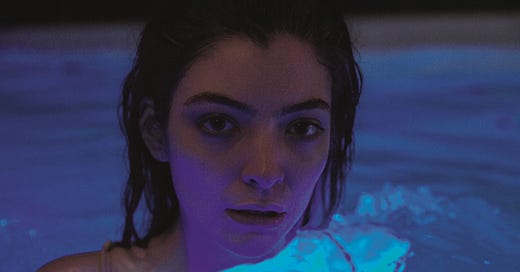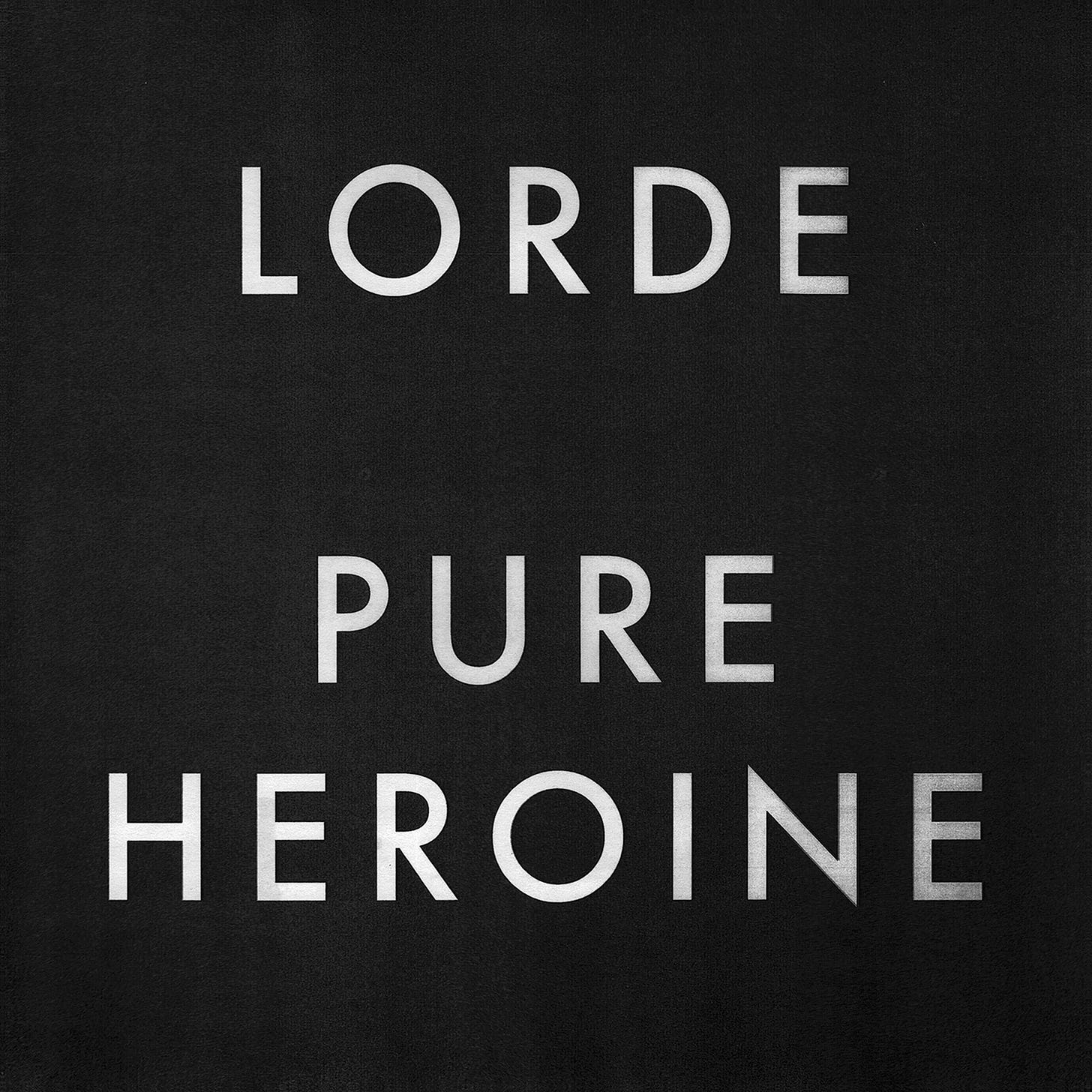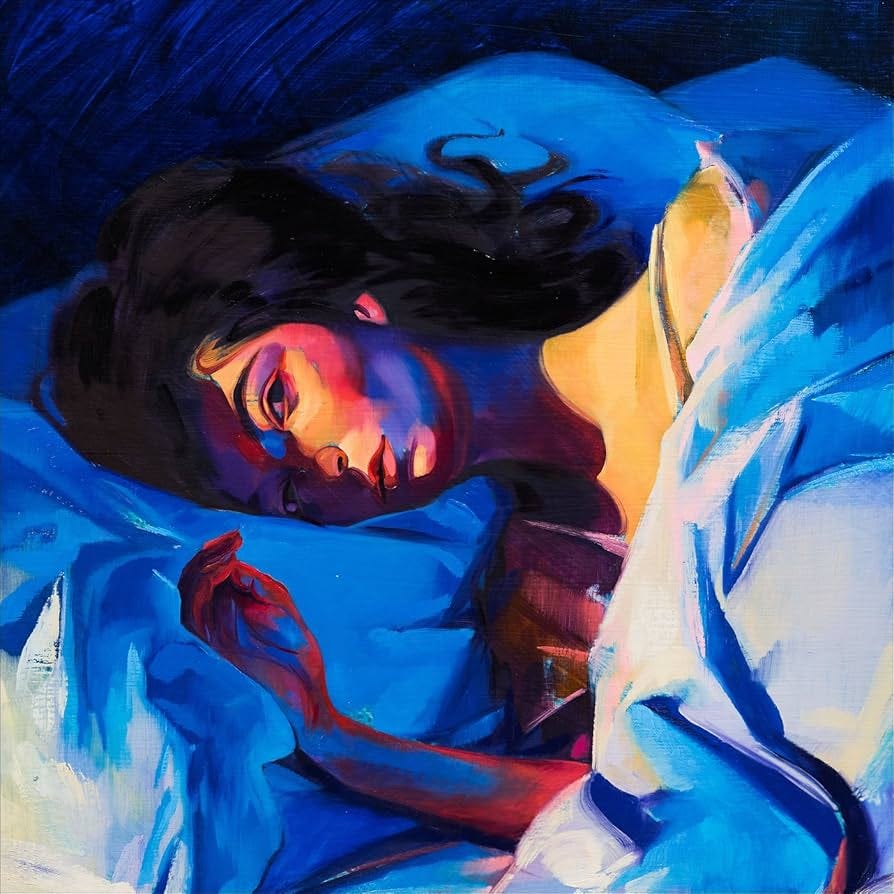I was born and raised in Madrid, but I became myself barreling down the 405, music blaring from the speakers of my white Hyundai Sonata. When I got it in October of my sophomore year of college, I discovered a new kind of physical and emotional freedom. Driving became a form of escapism, a ritual I clutched in the hope that if I drove far enough, or fast enough, I might outrun my depression. Lorde often rode shotgun. I trusted her to witness my erratic feelings and to guide me through the madness of growing up.
When I first got my car, Lorde had only released Pure Heroine. I had liked it upon its release years earlier, mostly for its production. The minimalist beats stood out from the maximalist, EDM-infused pop that dominated the early 2010s. The lyrics to the lead single, Royals, were catchy and easy to memorize. But at fifteen, the message of the album went completely over my head. I was too busy living through the experiences it describes to realize they were ephemeral.
Revisiting the album at eighteen was like seeing it through a new lens. I was far enough from my adolescence to recognize that things had shifted without me noticing. The move from Spain to LA had been a visible, obvious change, but my internal evolution had been quieter. I felt like I’d missed my coming of age. Turning to Pure Heroine allowed me to give it the weight it deserved, to relive the highs and lows of high school. It succinctly captures what it’s like to be on the precipice of transformation. Only a teenager could have written it, and yet it’s unbelievable that one actually did.
A childhood friend came to visit and told me that the first time she felt like an adult was when I picked her up at the airport in my own car. For months I had been blasting Pure Heroine during aimless drives, its electro-pop beats and Lorde’s raw voice the soundtrack to my vulnerability. But it wasn’t until that moment that I realized a new version of me was ready to take over the adolescent I was mourning.
During one particular late-night outing, Ribs rumbled through the speakers as Downtown LA glistened on my left. This dream isn’t feeling sweet, we’re reeling through the midnight streets, and I’ve never felt more alone, it feels so scary getting old. I gripped the steering wheel, heart pounding with fear of change, of not knowing what lay ahead. I was floundering: cycling through meds as my psychiatrist fumbled for a fix, failing courses, struggling to keep a long-distance relationship from unraveling before it had even fully begun.
Lorde released a new album and I listened, but I didn’t connect. I wasn’t there yet. I clung to Pure Heroine for its familiarity, unwilling to let go of the final flashes of my adolescence. It took a year of music, antidepressants, therapy, and the relentless passage of time for me to finally turn the page. I was slowly healing, beginning to embrace the future instead of retreating from it.
But stability is rarely permanent. Eventually, life turned chaotic again, and this time Pure Heroine’s cool detachment couldn’t help me. I needed something messier. I needed Melodrama.
No one’s ever really ready for their first breakup, no matter how many warning signs precede it. After my short-lived peace came a disorienting, seemingly endless fall that landed me into a well of emotion I had no words for. I’d never felt anything like it, and I wasn’t sure I’d survive it.
I took to the car and the emotional sprawl of Melodrama to expand on this feeling I didn’t have a name for. Its lush and theatrical sound guided me through my rapidly changing moods—from yearning for the romanticized early stages of the relationship to the depths of its aftermath. A sexy invitation in but my hips have missed your hips, so let’s get to know the kicks; anger in you’re walking out to be a good man for someone else; unworthiness in he don’t wanna know me, says he made the big mistake of dancing in my storm, says it was poison.
Drives weren’t aimless anymore: they always had a destination. I needed to cry with the windows rolled down, wind whipping through my hair, but I also needed boundaries for my grief. I needed to know that at some point the music would fade and my day would resume. On days when I couldn’t conjure up an errand that required me to drive across town I would go to the gas station and pick up my breakup special: Harvest Snaps black pepper baked green peas, Cadbury chocolate, Arizona iced tea.
Sometimes the weight would completely evaporate off my shoulders, only to return soon after, heavier than before. I reserved crying for the car, and I controlled my grief by limiting my driving. This delicate dance went on for months, but with the threat of spending Valentine’s Day alone looming over me, I decided to visit a friend in San Francisco. The drive took six and a half hours, during which I only listened to Melodrama. For the first time I was indulging my grief, leaning into anger, sorrow, and regret.
My white Sonata roared up the 5, Lorde’s voice echoing into the valley. I was feral, belting I’ll love you ‘til my breathing stops, I’ll love you ‘til you call the cops on me; cigarette in hand, eyes so puffy I could barely keep them open, snot falling freely down my face. I looked and felt unloveable, and yet I believed, with my whole being, that I could love someone else. That maybe I always would.
Catharsis.
And suddenly: I’ll start letting go of little things ‘til I’m so far away from you… Had that always been in Hard Feelings/Loveless?
Melodrama, the breakup bible that it is, is also a story of healing. By the fourth or fifth listen that day, a quiet serenity began to creep in. I was starting to see the relationship in all its glorious complexity. It hadn’t been perfect and it hadn’t been miserable, it had simply been. And now it was over.
Was I over it? Of course not!
I kept replaying the album, revisiting the pain again and again and again and again. I had spent so much of my youth depressed that sadness was familiar, even comforting. Melodrama was a way of prolonging the heartbreak just a little longer, to prove it meant something. Slowly, with each listen, the ache softened. I began to grow bored of it, and that was a kind of progress. By the time I pulled into San Francisco, I was ready to move on.







